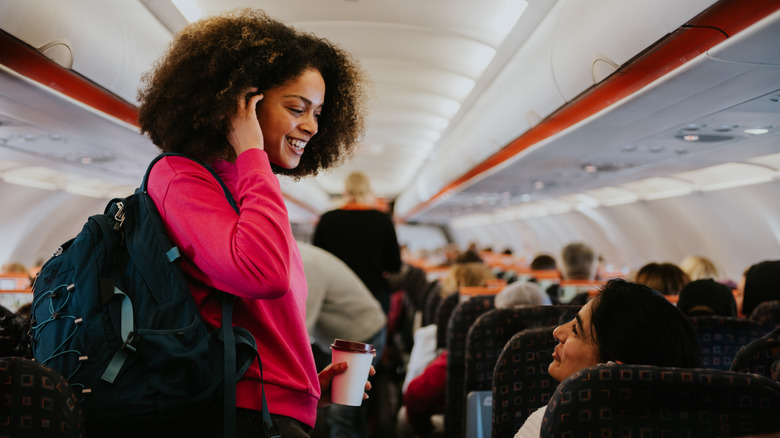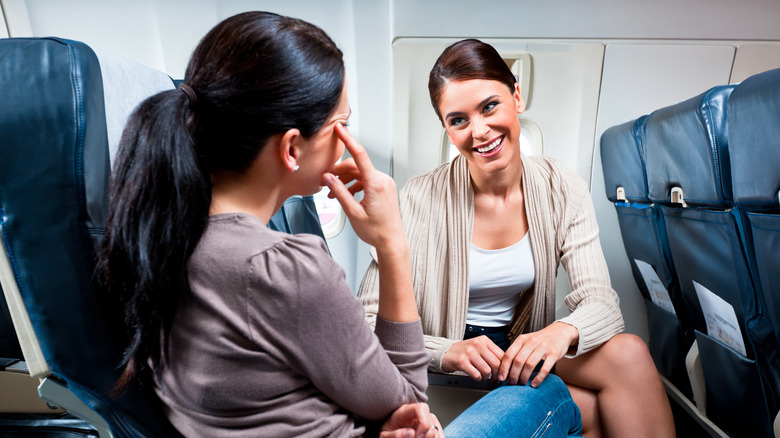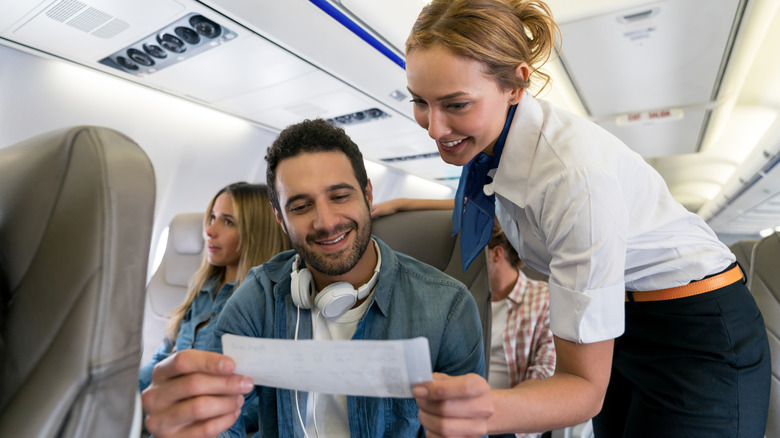The Best Way To Politely Decline A Request To Swap Seats On A Plane
You've booked your flight, paid for your preferred seat in advance, and now the time has come for your trip. You board the plane and settle into your spot until someone taps you on the shoulder: "Hey, do you mind if we swap seats?" A dilemma arises: You've paid for your window or aisle seat (let's be real, no one wants the middle seat), yet you want to be nice and say yes, but deep in your heart is a loud and resounding "NO!" For anyone with social anxiety, flight jitters, and people-pleasing tendencies, seat swap requests are a nightmare. Too often, nice people say "yes" and then spend the rest of their long-haul flight in the middle seat next to the lavatory and a crying baby, vowing to never be "nice" again.
While it's courteous to consider seat swap requests, it's perfectly acceptable to decline. We spoke exclusively to Nikesha Tannehill Tyson, an etiquette expert with The Swann School of Protocol Shreveport and author of "Going Public," who explained that handling such situations with politeness and firmness is key. The etiquette of seat airplane seat swapping is complicated, but here's how to handle it effectively: When someone asks you to swap seats, it's important to respond politely and clearly. Tyson suggests making eye contact, smiling, and replying with a simple, "No thank you, I'd like to remain in this seat" or "I selected this seat when I booked my flight, thanks for asking." These responses are respectful and convey your decision without requiring further explanation.
The fine art of saying no
The crucial part of this interaction is to remain firm. If the requester persists and asks "Why?", Nikesha Tannehill Tyson explains that you can simply reiterate your preference to keep your seat. It's essential to remember that you aren't obligated to move, and the other passenger had the same opportunity to select and pay for their seat when booking their flight, just like you did. It's not your fault they did not prepare in advance. Ultimately, you are entitled to sit in the seat printed on your boarding pass. "There is no explanation needed," says Tyson. The only possible exception to a seat-swap calculation is when families with kids are involved. "Do give grace to passengers traveling with babies and children," she suggests.
In some cases, the passenger may continue to press the issue. They may say, "Oh, please!" or "Come on!" or give different reasons and plead their case as to why you should feel obligated to switch seats with them. The passenger may even get angry, and the whole situation might get side-eye from fellow passengers nearby. If this happens, it's important to stay calm and polite. "It is not considered rude to refuse a request to swap," reassures Tyson. Reiterate your decision firmly, and if necessary, Tyson recommends that you request assistance from a flight attendant. Flight attendants are trained to handle such situations as part of their job and can help mediate if the other passenger becomes upset or insistent.
Do's and don'ts for swapping seats
What if you find yourself on the other end and want to swap seats with another passenger? First and foremost, it's important to time your request appropriately. Ideally, "during boarding before the passenger gets settled," explains Nikesha Tannehill Tyson. They're much less likely to move for you after they've put all their things away, started watching a movie, and wiped down the tray table. Make your request politely at the right time. You can also ask the flight attendants for help, as suggested by Tyson.
To make the switch more appealing, you can offer to buy the other passenger an on-flight drink or pay for airline extras — this is not bribery, but rather just a way to "sweeten the deal." Tyson asserts that the switch must also be a fair one, and you should definitely "reconsider asking a passenger to swap their aisle seat for your middle seat." Always remember that they likely had to pay to choose their seat. If the answer is "no," accept it and don't make them feel guilty.
Sometimes, there may be valid, non-disclosable reasons for declining, such as a personal health condition or even being an armed federal officer who must stay in a designated seat for security reasons (yes, that's a thing). However, under any circumstances, do not sneakily switch seats on a plane without informing the flight attendants. By following the advice of etiquette expert Nikesha Tannehill Tyson, you can handle these situations with poise.


